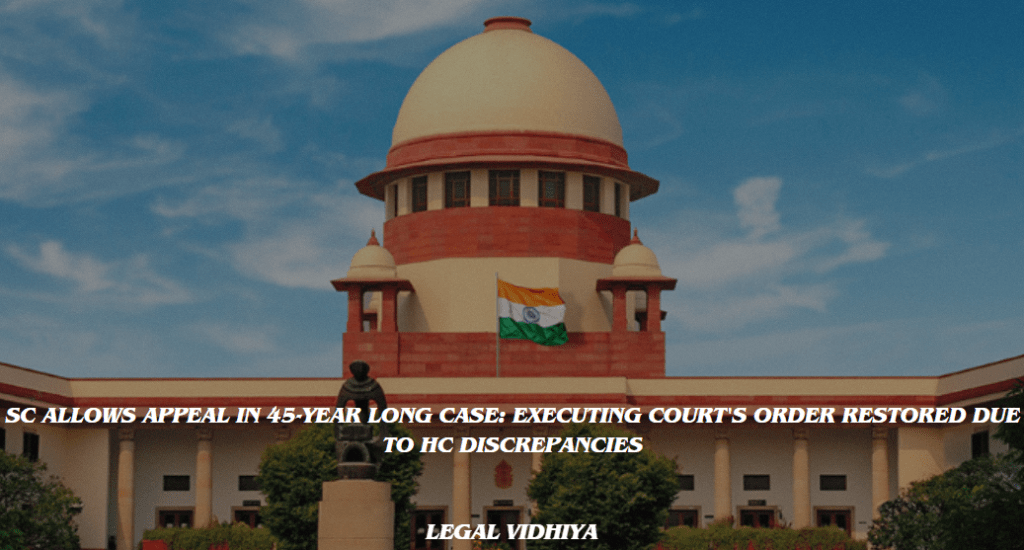
Justice Vikram Nath granted leave to the appellant, the decree holder, to challenge the High Court of Rajasthan’s judgment. The revision filed under Section 115 of the Code of Civil Procedure, 1908, challenging the order of the Executing Court dated 03.05.2007 rejecting objections under Section 47 CPC, has been allowed. The Executing Court’s order was set aside, declaring the Trial Court’s decree dated 09.05.1979 executable and a nullity, and accordingly, the objections under Section 47 CPC were allowed.
The dispute involves a property at Municipal Nos. 52-57, Maniharon Ka Rasta, Jaipur, owned by Ghulam Mohiuddin (Defendant No.1). An agreement to sell was made on 04.10.1967 by Saeeduddin (Defendant No.2), acting under power of attorney for Defendant No.1. The plaintiff filed Suit No.13/72 for specific performance when the sale deed wasn’t executed. A compromise was reached on 11.05.1978, stating Rs.15,000/- of Rs.40,000/- was received by the Defendants. Defendant No.1 agreed to execute the Sale Deed by 01.07.1978 upon receiving Rs.25,000/-. If not, the plaintiff could pursue registration through court, with costs shared. Defendant No.1 agreed to vacate the third-floor residence for the plaintiff before registration. Tenants agreed to sign rent notes for the plaintiff. Proforma defendant Ahsan Ahmed relinquished rights to the property.
Defendant No.2, Saeeduddin, admitted he lacked the right to sell the property, which Defendant No.1, the true owner, now acknowledges. Hence, there’s no obstacle to passing the compromise decree. The property, described as a solid three-story house with a courtyard and five shops, was detailed in the Compromise Deed.
The Additional District & Sessions Judge, Court No.1, Jaipur City, proceeded with the compromise and allowed time for verification. Initially dismissed in the absence of the Plaintiff on 09.05.1979, the suit was reinstated upon application. Plaintiff, Rehan Ahmed, withdrew proceedings against Defendant No.2, Saeeduddin, and Defendant No.3, Ahsan Ahmed. The suit was dismissed against them and decreed against Defendant No.1, Ghulam Mohiuddin, as per the compromise. When Defendant No.1 failed to execute the Sale Deed, the Plaintiff initiated execution proceedings. Defendant No.1’s objections regarding non-payment of balance sale consideration and delay were dismissed by the Executing Court on 09.12.1998. General Tarik
The Executing Court dismissed Smt. Akhtar Un Nisa’s objections under Section 47 CPC. She appealed, and the High Court allowed her revision, but this Court found the High Court’s decision flawed. It wrongly assumed joint ownership by Defendants No. 1 and No. 2 and invalidated the decree due to Defendant No. 2’s absence from the compromise. However, Defendant No. 2 consistently denied ownership, and previous court orders upheld Defendant No. 1’s sole ownership. The compromise, reached on 11.05.1978, was verified on 09.05.1979 after delays caused by Defendant No. 1’s absence and illness. Finally, a fresh compromise application was submitted on 09.05.1979, signed by both parties and duly verified, fulfilling all requirements. The Court passed the decree based on this verified compromise.
The High Court wrongly assumed joint ownership by Defendants No. 1 and No. 2 and invalidated the decree because Defendant No. 2’s signature was absent on the compromise. However, Defendant No. 2 consistently acknowledged he had no ownership rights, as stated in his written statement and a family arrangement. The compromise, signed by Defendant No. 1 and the plaintiff and later verified by Defendant No. 2, confirms Defendant No. 1 as the sole owner. Previous court orders affirmed these facts. Thus, Plaintiff and Defendant No. 1 were the only necessary parties for the compromise as Defendant No. 1 owned the property.
The High Court wrongly claimed that the Trial Court didn’t adhere to Order XXIII, Rule 3 of the CPC regarding the verification of the compromise. However, the compromise was indeed reached on 11.05.1978, but it’s verification was delayed due to various adjournments caused by Defendant No.1’s absence or illness and other procedural delays. On 09.05.1979, a fresh compromise application with identical terms was submitted and signed by both parties due to the original being misplaced. The Trial Court then correctly recorded and verified this compromise, meeting the requirements of Order XXIII, Rule 3 of the CPC.
Defendant No. 1 was required to execute and register the sale deed by 01.07.1978 upon receiving the balance payment of Rs. 25,000/-. The decree’s execution hinged on Defendant No. 1 fulfilling conditions such as obtaining the NOC and ensuring Defendant No. 2 vacated the property. Although the recording of the compromise and subsequent decree on 09.05.1979 were delayed, they complied with CPC procedures.Additionally, General Tarik, as the legal heir of Defendant No. 2, previously objected to execution proceedings, dismissed in 1988. Subsequent appeals, including to the Supreme Court, were also dismissed. Thus, similar objections by Respondent No. 1, Smt. Akhtar Un Nisa, would be an abuse of the process of law.
Based on these reasons, this Court upholds the Executing Court’s rejection of objections under Section 47 CPC filed by Smt. Akhtar Un Nisa on 03.05.2007.
The appeal is allowed, setting aside the High Court’s judgment and restoring the Executing Court’s order of 03.05.2007. Respondent no.1’s objections under Section 47 of the CPC are rejected. No costs are awarded.
CASE TITLE : REHAN AHMED (D) THR. LRS VS AKHTAR UN NISA (D) THR.LRS, SLP (Civil) No.18772 of 2014
Written by: Ayesha Hussain, College name : Surendranath Law College, 4th year B.A.LL.B(HONS), Intern under Legal Vidhiya
REFERENCES
https://www.advocatekhoj.com/library/judgments/announcement.php?
Disclaimer: The materials provided herein are intended solely for informational purposes. Accessing or using the site or the materials does not establish an attorney-client relationship. The information presented on this site is not to be construed as legal or professional advice, and it should not be relied upon for such purposes or used as a substitute for advice from a licensed attorney in your state. Additionally, the viewpoint presented by the author is of a personal nature




0 Comments